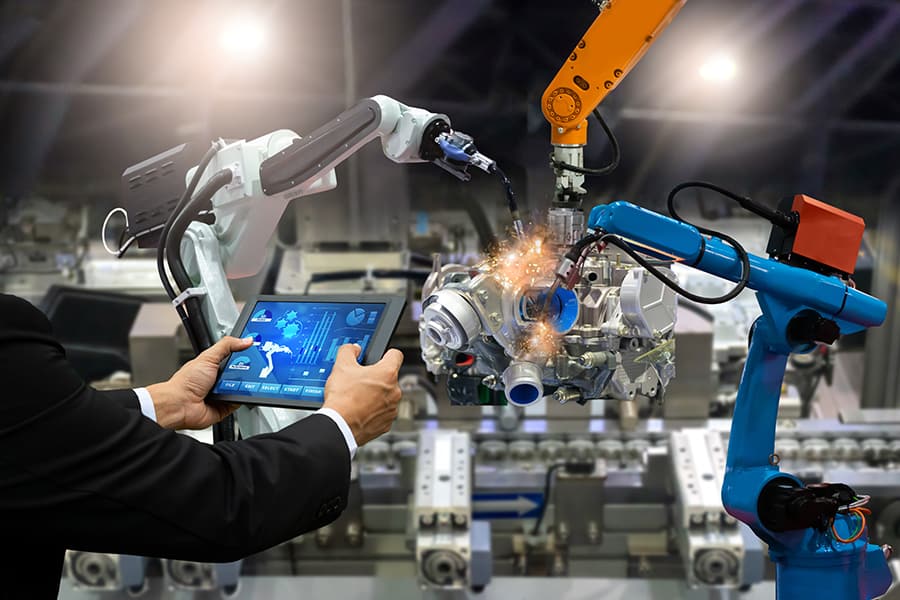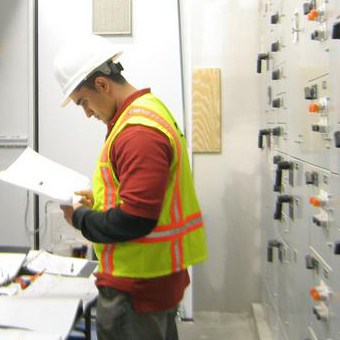How are engineers jobless? Engineers aren’t immune to job loss and hardships. There are many factors that can leave engineers without work.
Here are the top 8 reasons why engineers might find themselves jobless:
- Weakening economies
- Declining company revenue
- Shrinking engineering fields
- Oversupply of engineers
- Globalization
- Artificial Intelligence (AI) / Automation
- Lean employment models
- Mindset of engineers
Let’s dive into each of these reasons so we can understand how engineers can end up jobless.
#1 Weakening economies

Economy plays a massive role in the engineering job market. Remember these events that shook up the U.S. job market?
- Dotcom bubble burst (2001)
- Great Recession (2009)
- COVID-19 pandemic (2020)
Each of these events, especially the first two, unleashed a tsunami of job-seeking engineers. Add to that the fresh-faced graduates joining the job market every year, and you’ve got a fierce battle for a limited number of jobs.
With each of these events, more so the first two, engineers flooded the job market. To top it off, every year countless new graduates enter the job market. This spikes competition for a limited number of jobs.
Check out the job loss figures from these three economic dips:
| U.S. job loss event | Event year | Total job loss count |
|---|---|---|
| Doctom burst | 2001 | 2 million |
| Great recession | 2009 | 2.6 million |
| COVID-19 great lockdown | 2020 | 22 million |
2009 Great recession impact on traditional engineering jobs
Traditional engineering fields include civil, power, mechanical, and structural. These are the fields that deal with public construction, designing for future demand like:
- Homes
- Water pump stations
- Water and wastewater treatment plants
- Roads and bridges
- Substations
- Transmission lines
Now, these engineers don’t feel the pinch of a weakened economy straight away. Let’s rewind to 2009’s Great Recession to illustrate.
As home foreclosures skyrocketed and banks crumbled, cities saw their revenues dwindle due to unpaid property taxes. Public agencies slammed the brakes on expansion and improvement projects.
And just like that, traditional engineers were left twiddling their thumbs. I remember in 2009, work in the power industry vanished faster than you can say “recession.” Projects were few and far between, with only emergency retrofit designs to keep us busy.
#2 Declining company revenue
When companies hit financial turbulence, they tighten their belts and hire less – a double whammy for jobless engineers. They get laid off, and then they can’t find new jobs because nobody’s hiring.
Moreover, one company’s struggles can create a domino effect for other engineers. For instance, a struggling company might:
- Spend less on software from other tech companies, leading to revenue drops and layoffs for them.
- Contract out fewer engineers.
- Freeze infrastructure upgrades, which then reduces traditional engineering work.
As if that’s not bad enough, companies don’t want to train new engineers during tough times. Training is a short-term expense, while an experienced engineer can hit the ground running.
#3 Shrinking engineering fields
Gaze into the crystal ball, and you’ll see some engineering fields slowly fading away.
Take mining and petroleum engineering, for example. These industries aren’t completely vanishing, but finding a job is getting harder, especially for inexperienced engineers.
Just look at the data for undergraduate enrollment in petroleum engineering below. You can see enrollment dropping year after year as renewable energy advances:
| School year | Full-time undergrad enrollment in petroleum engineering (U.S.) | Part-time undergrad enrollment in petroleum engineering (U.S.) |
|---|---|---|
| 2015 | 8,232 | 855 |
| 2016 | 6,397 | 662 |
| 2017 | 4,813 | 540 |
| 2018 | 3,694 | 541 |
So, my advice is this: don’t waltz into a field thinking you’ll land a job just because you’re an “engineer.” Engineers are a dime a dozen, and many are unemployed. Be strategic, pick your field wisely, and hone your skills to become a 10x engineer.
#4 Oversupply of engineers
These days, engineering graduates are pouring into the job market like never before. Thanks to more engineering schools popping up, some fields are becoming jam-packed with fresh talent.
| School Year | Number of U.S. undergrad students enrolled | U.S. population | Enrollment ratio to U.S. population |
|---|---|---|---|
| 2009 | 427,503 | 306,800,000 | 0.139% |
| 2010 | 450,685 | 309,300,000 | 0.146% |
| 2011 | 471,730 | 311,600,000 | 0.151% |
| 2012 | 504,690 | 313,900,000 | 0.161% |
| 2013 | 543,942 | 316,100,000 | 0.172% |
| 2014 | 568,452 | 318,400,000 | 0.179% |
| 2015 | 610,461 | 320,700,000 | 0.190% |
| 2016 | 601,266 | 323,100,000 | 0.186% |
| 2017 | 619,095 | 325,100,000 | 0.19% |
| 2018 | 622,502 | 327,200,000 | 0.19% |
It’s worth mentioning that new engineering fields are also being created, attracting even more people to study engineering. But the number of engineers is swelling faster than the U.S. population itself! Just take a peek at the table above.
This tidal wave of engineers leads to some pretty intense job competition. Add globalization into the mix, and you’ve got yourself a real challenge.
#5 Globalization
Engineers from all over the world are itching to work in America.
So, you’re not just competing with your local fellow engineers anymore. Nope, you’re up against a whole world of eager people. That’s when the age-old supply and demand curve kicks in.

Important Note: Immigrating engineers also create a bunch of new U.S. businesses, which in turn generate even more jobs. Currently, the U.S. hands out 85,000 H-1B visas every year.
#6 Artificial Intelligence (AI) / Automation

AI and automation are quickly creeping into every corner of our lives. In the next decade, I reckon we’ll see these changes unfold:
- Entry-level positions: Say goodbye to many entry-level jobs, especially those with repetitive tasks. They’re the easiest to automate, after all.
- Fewer engineers: One engineer will take on the workload of five, managing a bunch of AI-driven machines.
- Vanishing engineer positions: Some engineering jobs will simply disappear. For instance, product engineers might be replaced by AI-powered websites that provide product info to customers on demand.
Sure, AI will create new engineering jobs, but they’ll be more specialized. This shift will likely leave lower-level and underperforming engineers in the dust.
#7 Lean employment models
Employers are shaking up their hiring practices. They’re opting for contractors instead of full-time employees and outsourcing work to cheaper parts of the U.S., or even other countries. Why? Well, here’s a few reasons:
- New state employment laws mean more liability for full-time employees.
- They want to run a leaner operation to beef up their cash reserves, just in case the economy gets rocky.
- They’re aiming to boost profits by trimming the fat—letting go of low-performing employees and skipping out on extra benefits like health care and 401(k) matching.
- It’s easier to adapt to fast-changing markets and maximize profits.
- Hiring contractors for peak demand periods is a breeze compared to full-time employees. Once demand drops, they can simply let the contractors go.
Companies today are facing more risks, pushing them to get creative with their employment strategies. According to Deloitte’s 2016 global outsourcing survey, these are some reasons why companies choose to outsource:
| Reasons for outsourcing | Percentage |
|---|---|
| Cost cutting | 59% |
| Enable focus on core business | 57% |
| Solve capacity issues | 47% |
| Improve service quality | 31% |
| Critical to business needs | 28% |
| Access to intellectual capital | 28% |
| Manage business environment | 17% |
#8 Mindset of engineers
Think of engineering like your favorite sports league. In the NBA, you’ve got different player tiers, right?
- Superstars
- Stars
- Role players
- Benchwarmers
The same goes for engineers. Some are super driven, while others lack ambition. The latter just want to collect a paycheck while doing the bare minimum. This mindset plays a huge role in their employment prospects. Let’s compare two engineers on opposite ends of the spectrum.
Engineer #1 (lacks ambition)
While employed, they:
- Do the bare minimum to get by
- Produce average work
- Don’t keep up with the latest technologies and advancements
During their job search, they:
- Submit a few same-city job applications every week
- Collect unemployment while playing video games all day
Engineer #2 (highly motivated)
While employed, they:
- Go the extra mile to always produce high-quality work
- Ask the boss for extra work to avoid downtime
- Offer a helping hand whenever possible
- Constantly self-research and learn more
During their job search, they:
- Treat the job hunt like a full-time gig, applying to 10+ jobs daily across the country
- Boost their resume by learning new skills and taking online courses
- Attend job recruitment events
- Seek help in finding a job
- Consider starting a business as a backup plan
In a nutshell, the job market is evolving fast. Just having an engineering degree won’t cut it anymore. You’ve got to hustle and stand out from the crowd. If you’re like Engineer #1, chances are you’ll be jobless for a while.
The key: passion for engineering
A lot of people become engineers for the wrong reasons:
- Prestige
- Money
- Peer pressure
- Desire to work in cool cities
But what really matters is passion!
I can’t help but want to learn about engineering, whether I make money or not. I’m just hooked!
That’s the kind of passion you need, especially with today’s fierce competition. Without a genuine interest in your field, you’ll struggle.

Important Note: The education system has its flaws. You pay a fortune for tuition, but you’re not taught real-world engineering skills. That’s why you need a passion for self-learning.
“How are engineers jobless?” wrap up
Engineers aren’t exempt from job loss. They need to adapt to the job market to stay afloat. As finding work becomes harder, it’s more important than ever to be prepared.
On the bright side, the world increasingly relies on engineers. So if you max out your engineering skills, you’ll have a ton of amazing job options and business opportunities.
What do you think is the best way to stay employable in the future? How do you tackle your job search?

Author Bio: Koosha started Engineer Calcs in 2019 to help people better understand the engineering and construction industry, and to discuss various science and engineering-related topics to make people think. He has been working in the engineering and tech industry in California for well over 15 years now and is a licensed professional electrical engineer, and also has various entrepreneurial pursuits.
Koosha has an extensive background in the design and specification of electrical systems with areas of expertise including power generation, transmission, distribution, instrumentation and controls, and water distribution and pumping as well as alternative energy (wind, solar, geothermal, and storage).
Koosha is most interested in engineering innovations, the cosmos, sports, fitness, and our history and future.
